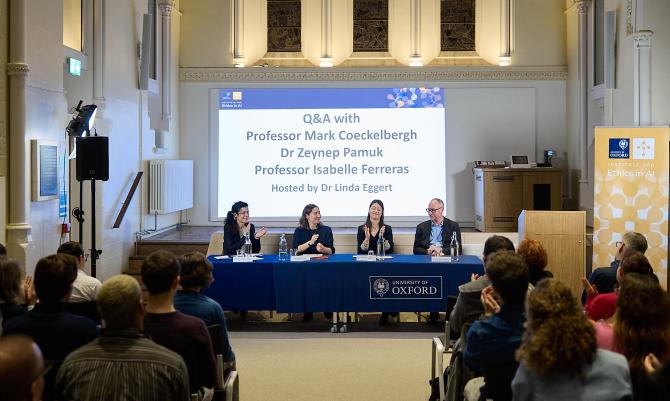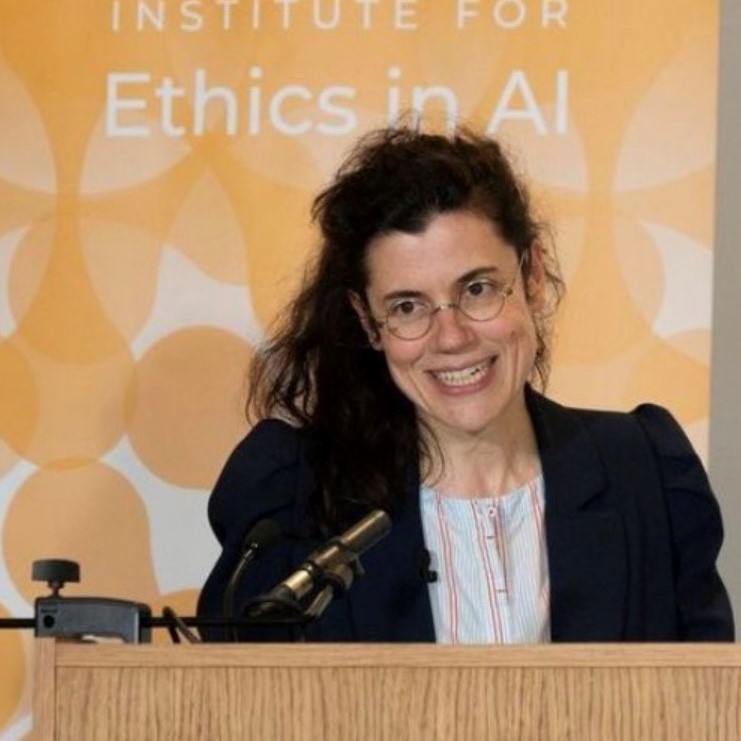
A recording of this event is now available to watch via the Institute's YouTube channel.
Abstract: As many leading voices in debates about ethics and AI recognize, AI creates risks for democracy and we need to democratize AI. But what, exactly, are these risks, and what does it mean to democratize AI? Drawing on his forthcoming book Why AI Undermines Democracy And What To Do About It, Mark Coeckelbergh offers an overview of some of the risks and mobilizes the tradition of political-philosophical republicanism to argue that and why AI should be developed in a more participatory way and serve the common good, enabled by education and regulation that create possibilities for non-domination and communication.
The Institute for Ethics in AI will bring together world-leading philosophers and other experts in the humanities with the technical developers and users of AI in academia, business and government. The ethics and governance of AI is an exceptionally vibrant area of research at Oxford and the Institute is an opportunity to take a bold leap forward from this platform.
Every day brings more examples of the ethical challenges posed by AI; from face recognition to voter profiling, brain machine interfaces to weaponised drones, and the ongoing discourse about how AI will impact employment on a global scale. This is urgent and important work that we intend to promote internationally as well as embedding in our own research and teaching here at Oxford.
Professor Mark Coeckelbergh is Professor of Philosophy at the University of Vienna and ERA Chair at the Institute of Philosophy of the Czech Academy of Sciences. He was member of the High-Level Expert Group on AI for the European Commission and President of the international Society for Philosophy and Technology. His is the author of AI Ethics (MIT Press), The Political Philosophy of AI (Polity Press), and Why AI Undermines Democracy and What We Can Do About It (Polity Press, forthcoming).
Commentators

Dr Zeynep Pamuk is Associate Professor in the Department of Politics & International Relations and Professorial Fellow of Nuffield College, University of Oxford. Before joining Oxford, she was Assistant Professor in the Department of Government at the London School of Economics and the Department of Political Science, University of California, San Diego. She holds a PhD from Harvard and a BA from Yale. Her research interests are in democratic theory, the role of expertise in politics, and the impact of artificial intelligence and automation on democracy. She is the author of Politics and Expertise: How to Use Science in a Democratic Society (Princeton, 2021), which has won the American Political Science Association's Foundations of Political Theory Section First Book Award.

Professor Isabelle Ferreras is currently a Visiting Fellow at the Institute for Ethics in AI, and Fellow of Jesus College, Oxford. Isabelle a senior tenured fellow (Maître de recherches) of the Belgian National Science Foundation (F.N.R.S., Brussels). She is professor of sociology at the University of Louvain (Louvain-la-Neuve, Belgium) where she teaches at the Department of Social and Political Sciences, at the Institut des sciences du travail and at the Economics School of Louvain. Isabelle is a tenured researcher of the Louvain CriDIS (Centre de recherches interdisciplinaires Democracy, Institutions, Subjectivity), a Senior research associate of the Center for Labor and a Just economy at Harvard Law School. Ferreras is an elected member of the Royal Academy of Sciences, Humanities and the Arts of Belgium. In 2019, she was elected Director of her Class Technology and Society, and President of the Royal Academy of Belgium for the years 2021 and 2022.
Since co-launching it in 2020, Isabelle Ferreras coordinates the global network focused on www.DemocratizingWork.org Her most recent work in English includes Firms as Political Entities. Saving Democracy through Economic Bicameralism (Cambridge University Press, 2017), Democratize Work. The Case for Reorganizing the Economy (co-edited, University of Chicago Press, 2022), the June 2023 special issue of Politics & Society on "Democratizing the Corporation" discussing her lead paper. Forthcoming book: Isabelle Ferreras, Tom Malleson, Joel Rogers (ed.), Democratizing the Corporation: The Bicameral Firm and Beyond. (March 2024) Real Utopia Series, New York City/London: Verso.
Hosted by

Dr Linda Eggert is an Early Career Fellow in Philosophy. Linda’s work spans topics in moral, political, and legal philosophy, and mainly addresses issues in normative and practical ethics and theories of justice. Linda is especially interested in duties to rescue and the ethics of other-defence, issues in non-consequentialist ethics, and global and rectificatory justice. Linda’s work also explores how these areas bear on the ethics of artificial intelligence and digital technology. Linda is particularly interested in the ethics of delegating to AI; in whether we have a moral right not to be subject to fully automated decision-making in certain contexts; in how human rights and democratic values should shape what technologies we create and deploy; and in the ethics of military applications of AI.
Before joining the Institute for Ethics in AI, Linda was an Interdisciplinary Ethics Fellow at the McCoy Center for Ethics in Society at Stanford University, a Fellow-in-Residence with the Edmond & Lily Safra Center for Ethics at Harvard University, and a Technology & Human Rights Fellow with Harvard’s Carr Center for Human Rights Policy. In 2023, Linda was appointed to an Associate Professorship of Philosophy in the Faculty of Philosophy, which she will take up in 2024. Linda completed her DPhil at Oxford in 2021
